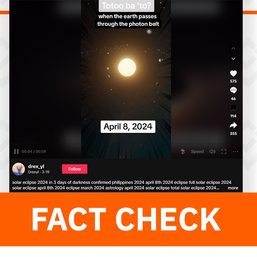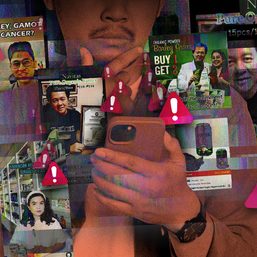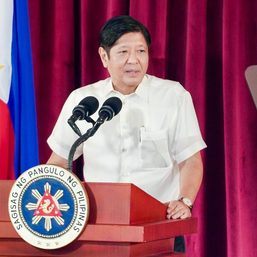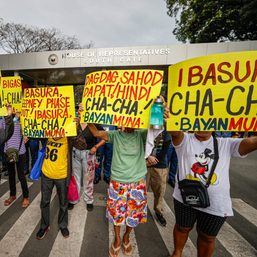SUMMARY
This is AI generated summarization, which may have errors. For context, always refer to the full article.

MANILA, Philippines – Among Filipino adults, majority or 58% said social media influencers, bloggers, and/or vloggers spread false information about politics and the government, a September Pulse Asia survey found.
Following that percentage, 40% believe journalists were peddlers of false political information. A previous report found that trust in news was declining, globally and in the Philippines.
Meanwhile, national level politicians (37%) and local politicians (30%) were also perceived as peddlers of false political information. Other sources of such according to respondents were civic leaders or NGO leaders (15%), businessmen (11%), and academics, professors, or teachers (4%).
A big majority of the respondents in Metro Manila (69%), Balance Luzon (67%), and those in Classes ABC (69%) and D (58%) said social media influencers, bloggers, and/or vloggers were peddlers of false political information.
In the Visayas, it was also a big majority (67%) which identified national level politicians as peddlers of such. In Mindanao, more people believe social media influencers (43%) and journalists (41%) propagate false political information.
Most say ‘fake news’ is a problem
Most of the respondents or 86% of Filipino adults said false news or “fake news” was a problem in the Philippines. Agreement with this sentiment was more pronounced in Metro Manila (87%) and Balance Luzon (92%) than in the Visayas (77%) and Mindanao (81%).
The numbers are also high in Classes ABC (93%) and Class D (87%) than in Class E (74%).
Previously, a December 2021 Social Weather Stations survey found that 69% of Filipino adults believed the problem of “fake news” in media was serious.
Sources of false political information
Of the 90% who have consumed false information about politics and the government, 68% said they read, heard, or watched it on the internet or social media. 67% said they consumed such on television. Other sources include radio (32%), friends or acquaintances (28%), family or relatives (21%), leader in their community (4%), newspaper (3%), and religious leader (1%).
In most areas and in all socio-economic groupings, majorities said they encountered false political information online (60% to 78% and 62% to 78%, respectively) and on television (66% to 85% and 52% to 72%, respectively).
In Mindanao, the same percentages said they consumed false political information online (47%), on television (47%), and from friends or acquaintances (47%).
63% of Visayan respondents also said they encountered false political information on the radio.
A September 2021 Pulse Asia survey found that nearly half or 48% of Filipino adults got their news from the internet, with the greatest number (44%) of them citing Facebook.
According to the same 2021 survey, only 10% said they visited news websites for political news.
Frequency of consuming false political information
Almost all of the respondents (90%) of Filipino adults have read, heard, and/or watched “fake political news.”
Confidence in truthfulness, ability to determine veracity of political news
On the other side, 44% of Filipino adults were sure that the political news they consumed was not false or untrue, and another 44% said they were unsure whether they were consuming false political information or not. 11% admitted they were not certain about the veracity of the political information they encounter.
Majority of respondents across the country (55%), those in Metro Manila (63%), Balance Luzon (60%), Classes ABC (56%), and Class D (57%) said they were confident their fellow Filipinos could detect whether political information is true or false.
Meanwhile, 37% across the country were unsure of this ability, and 7% expressed lack of confidence in the ability of their fellowmen to tell true from false political information.
The survey was conducted from September 17 to 21, 2022, with 1,200 respondents aged 18 and above. The survey has a ± 2.8% error margin at the 95% confidence level. – Rappler.com
Add a comment
How does this make you feel?





![[EDITORIAL] Kapag bumabagsak ang ratings, balikan ang basics](https://www.rappler.com/tachyon/2024/04/animated-bongbong-marcos-sara-duterte-popularity-numbers-2024-carousel.jpg?resize=257%2C257&crop_strategy=attention)
![[OPINION] Can Marcos survive a voters’ revolt in 2025?](https://www.rappler.com/tachyon/2024/04/tl-voters-revolt-04042024.jpg?resize=257%2C257&crop=251px%2C0px%2C720px%2C720px)



![[Uncle Bob] The carpenters](https://www.rappler.com/tachyon/2024/03/women-influencers.jpg?resize=257%2C257&crop=230px%2C0px%2C720px%2C720px)



![[Under 3 Minutes] TikTok flexes its influence at Creators Night 2023](https://www.rappler.com/tachyon/2023/12/under-3-minutes-tiktok-creators-night-ls.jpg?resize=257%2C257&crop_strategy=attention)
There are no comments yet. Add your comment to start the conversation.